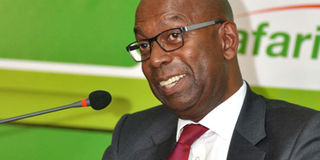Safaricom fires 56 employees in graft related cases

Safaricom Chief Executive Officer Bob Collymore during a past media briefing PHOTO | FILE
What you need to know:
- The investigations covered various frauds, including asset misappropriation, fraudulent expense claims and corruption cases.
- Safaricom also issued 16 employees with warning letters while seven were reported to law enforcement agencies. The number of sacked employees increased from 33 the year before.
Safaricom sacked 56 employees in the year ended March in a bid to staunch economic crime in the company.
The telecommunication company said it conducted 32 audit reviews in the period, three of which were special requests from management. The investigations covered various frauds, including asset misappropriation, fraudulent expense claims and corruption cases.
Safaricom also issued 16 employees with warning letters while seven were reported to law enforcement agencies. The number of sacked employees increased from 33 the year before.
FRAUD STATISTICS
Most of incidents occurred in the year ending in March 2012 when the telco fired 70 workers.
“We do not give you the option to resign when we fire you and if there is enough evidence we take you to court. We take ethics and corruption very seriously,” said Safaricom chief executive Bob Collymore at Michael Joseph Centre in Nairobi on Thursday.
“Whether you have stolen a hundred shillings or a hundred thousand shillings, or if you have disclosed a customer’s data, fraud is fraud. We have let people go.”
The report noted that Safaricom assessed each of its 12 divisions for risks related to corruption.
Among those identified were procurement fraud, losses during data migration, unauthorised termination of international traffic, under-invoicing and sabotage.
The malpractices are contained in Safaricom’s new sustainability report that highlights the firm’s performance in terms of economic, environmental, social and governance fronts.
Safaricom is among few companies in corporate Kenya to unveil its fraud statistics in a market where firms, according PricewaterhouseCoopers (PwC), prefer to remain silent on economic crimes fearing public relations backlash and brand damage.
Mr Collymore reckons that the report is about transparency and the quest to boost the firm’s internal processes and engagement with its stakeholders like suppliers and business partners.
“We can’t run our businesses purely for the results. We have to build sustainable, meaningful businesses,” he said.
“The report provides unparalleled insight into our business as a whole, indicating which areas we identify as most crucial to our continued sustainability.”
SHROUDED IN MYSTERY
In 2012, Safaricom was locked in a court battle where it lost nearly Sh100 million in a fraudulent banking scheme hatched and executed by its agents.
It sued 13 former agents for obtaining goods worth millions using forged banking slips.
The reluctance by most companies to sue or dismiss employees who have committed fraud for fear of reputation loss is also behind the rise in theft at the workplace, says PwC, adding that the extent of fraud can be appreciated more when the non-financial implications are considered, including loss of customers, business reputation, and low employee morale.
In Kenya, prosecution and sacking of workers due to fraud has mainly involved public servants and those employed by parastatals.
The consultancy said in its global survey conducted in 2012 that Kenya recorded the highest level of economic crime among 78 countries last year with procurement fraud and the theft of assets and money at work rising.





